

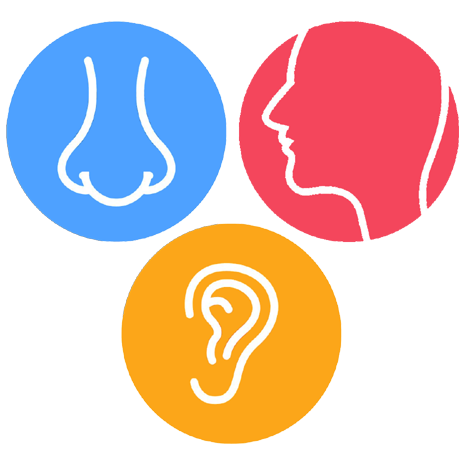
|
|
|
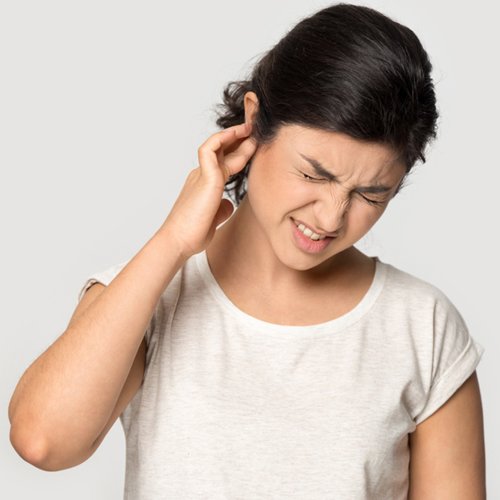 Ear pain (otalgia) commonly occurs in children, but it can also happen in adults. Pain that begins inside the ear is known as primary otalgia, whereas pain that originates outside the ear is known as secondary otalgia.
Ear pain (otalgia) commonly occurs in children, but it can also happen in adults. Pain that begins inside the ear is known as primary otalgia, whereas pain that originates outside the ear is known as secondary otalgia.
Ear pain can arise gradually or all of a sudden. The pain can feel dull, sharp, or burning, and can be temporary or ongoing. Usually, the pain arises in only one ear, but sometimes it can appear in both ears.
Symptoms that can accompany ear pain include:
• Fever
• Drainage from the ear
• Hearing loss
• Headache
• Difficulty chewing
• Jaw pain
• Clicking or popping
• Fussiness and irritability (in children)
• Increased crying (in children)
• Loss of appetite (in children)
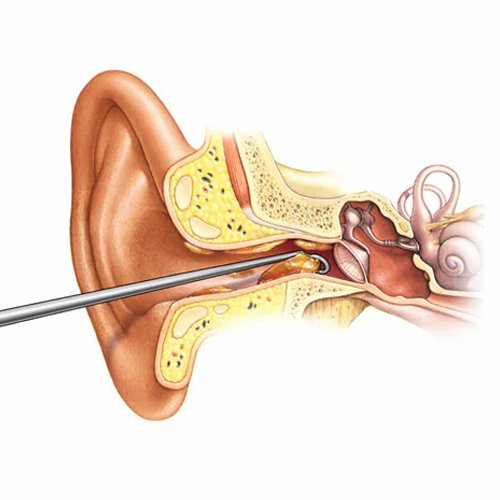 Earwax is produced by glands in the ear canal. Although scientists are still not completely sure why we have earwax, it does trap dust and other small particles and prevent them from reaching and possibly damaging or infecting the eardrum. Normally, the wax dries up and falls out of the ear, along with any trapped dust or debris.
Earwax is produced by glands in the ear canal. Although scientists are still not completely sure why we have earwax, it does trap dust and other small particles and prevent them from reaching and possibly damaging or infecting the eardrum. Normally, the wax dries up and falls out of the ear, along with any trapped dust or debris.
Everyone makes ear wax, but the amount and type are genetically determined just like hair color or height. Smaller or oddly shaped ear canals may make it difficult for the wax our ears make naturally to get out of the canal. This can lead to wax impactions. This is earwax buildup.
Symptoms of an earwax impaction include:
• Decreased hearing
• Dizziness
• Ear pain
• Plugged or fullness sensation
• Ringing in the ear
• Cough
More serious symptoms could mean you’ve developed an infection.
• Serious pain
• Drainage from the ear canal
• Itching
• Odor coming from the ear
• Fever
See your doctor if you think you may have any symptoms of an earwax impaction. Other conditions may cause these symptoms and it is important to be sure earwax is the culprit before trying any home remedies.
Go to the hospital if:
• You have a severe spinning sensation, loss of balance, or inability to walk
• You have persistent vomiting or high fever
• You have sudden loss of hearing
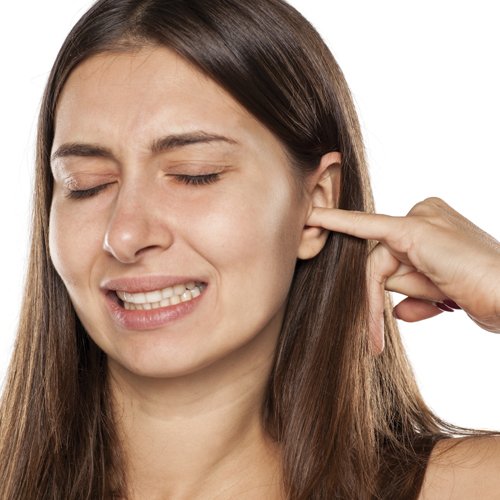 Itchy ears are a very common problem. For some people the problem is so bad that they stick various objects into the ears, causing trauma to the ear canal.
Itchy ears are a very common problem. For some people the problem is so bad that they stick various objects into the ears, causing trauma to the ear canal.
The most common causes of itching are a nervous habit, fungal infection or the beginning of an infection. Other causes can be skin diseases such as psoriasis or dermatitis. Some people with allergies complain of Itchy ears.
The ear canal may be normal on examination or there may be scaling of the skin. People aggravate the problem by using things such as bobby-pins, coat hangers and tooth picks to scratch the ear.
This can produce abrasions of the ear canal. Any break in the skin can allow bacteria to enter through this protective barrier. The ear will then become infected requiring it to be treated the same as swimmer's ear.
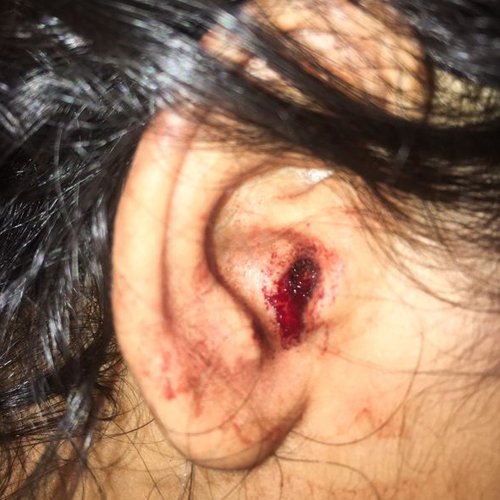 Ear bleeding is any sign of blood in your ear, or coming from your ear. It’s a symptom of many injuries and conditions. Depending on the cause, you may also have other symptoms such as ear pain, fever, hearing loss, facial paralysis, dizziness or ringing in your ear.
Ear bleeding is any sign of blood in your ear, or coming from your ear. It’s a symptom of many injuries and conditions. Depending on the cause, you may also have other symptoms such as ear pain, fever, hearing loss, facial paralysis, dizziness or ringing in your ear.
Most of the time, doctors can treat ear infections and other medical conditions that cause ear bleeding. Bleeding from your ears typically won’t lead to complications, but the underlying causes for the bleeding can lead to long-term issues.
Ears can bleed because of:
• A minor injury or cut
• Ruptured eardrum
• Trauma
• Severe ear infection
• Foreign objects in the ear
• Ear cancer
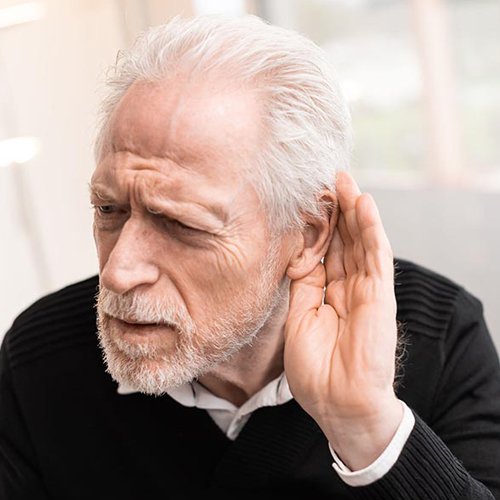 Deafness is usually the result of inner ear or nerve damage. It may be caused by a congenital defect, injury, disease, certain medication, exposure to loud noise or age-related wear and tear.
Deafness is usually the result of inner ear or nerve damage. It may be caused by a congenital defect, injury, disease, certain medication, exposure to loud noise or age-related wear and tear.
The chief symptom is an inability to hear sound.
For some, hearing may be possible with surgery or a hearing device. Lip-reading skills, written or printed text and sign language may help with communication.
Hearing loss that occurs gradually as you age (presbycusis) is common.
Hearing loss is defined as one of three types:
• Conductive (involves outer or middle ear)
• Sensorineural (involves inner ear)
• Mixed (combination of the two)
Aging and chronic exposure to loud noises both contribute to hearing loss. Other factors, such as excessive earwax, can temporarily reduce how well your ears conduct sounds.
You can't reverse most types of hearing loss. However, you and your doctor or a hearing specialist can take steps to improve what you hear.
 The lining of your nose contains many tiny blood vessels that lie close to the surface and are easily irritated.
The lining of your nose contains many tiny blood vessels that lie close to the surface and are easily irritated.
The two most common causes of nosebleeds are:
• Dry air — when your nasal membranes dry out, they're more susceptible to bleeding and infections
• Nose picking
Other causes of nosebleeds include:
• Acute sinusitis (nasal and sinus infection)
• Allergies
• Aspirin use
• Bleeding disorders, such as hemophilia
• Blood thinners (anticoagulants), such as warfarin and heparin
• Chemical irritants, such as ammonia
• Chronic sinusitis
• Cocaine use
• Common cold
• Deviated septum
• Foreign body in the nose
• Nasal sprays, such as those used to treat allergies, if used frequently
• Nonallergic rhinitis (chronic congestion or sneezing not related to allergies)
• Trauma to the nose
Less common causes of nosebleeds include:
• Alcohol use
• Hereditary hemorrhagic telangiectasia
• Immune thrombocytopenia (ITP)
• Leukemia
• Nasal and paranasal tumors
• Nasal polyps
• Nasal surgery
In general, nosebleeds are not a symptom or result of high blood pressure.
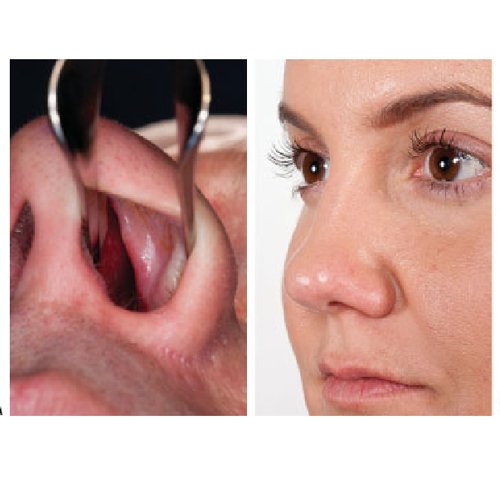 Nasal obstruction can be caused by a deviated nasal septum, enlarged turbinates, nasal polyps, enlarged adenoids, tumors, and nasal congestion. Nasal obstruction encompasses anything which hinders the airflow in and out of the nose affecting one or both nasal passages.
Nasal obstruction can be caused by a deviated nasal septum, enlarged turbinates, nasal polyps, enlarged adenoids, tumors, and nasal congestion. Nasal obstruction encompasses anything which hinders the airflow in and out of the nose affecting one or both nasal passages.
Nasal obstruction is usually caused by either swelling of the nasal tissue or an anatomical blockage which results in a narrowing of the nasal cavity and the feeling of the passages being congested. Nasal obstruction and can lead to sleeping disorders, snoring, and obstructive sleep apnea (OSA).
The otolaryngologists at Fort Worth ENT & Sinus specialize in all treatments for nasal obstruction, which includes at-home treatments, in-office treatments, and surgical treatments.
 A runny nose is excess nasal drainage. It may be a thin clear fluid, thick mucus or something in between. The drainage may run out of your nose, down the back of your throat or both.
A runny nose is excess nasal drainage. It may be a thin clear fluid, thick mucus or something in between. The drainage may run out of your nose, down the back of your throat or both.
The terms "rhinorrhea" and "rhinitis" are often used to refer to a runny nose. Rhinorrhea actually refers to a thin, mostly clear nasal discharge. Rhinitis refers to the inflammation of nasal tissues. Rhinitis often results in a runny nose.
If you have a runny nose, you may or may not also have nasal congestion.
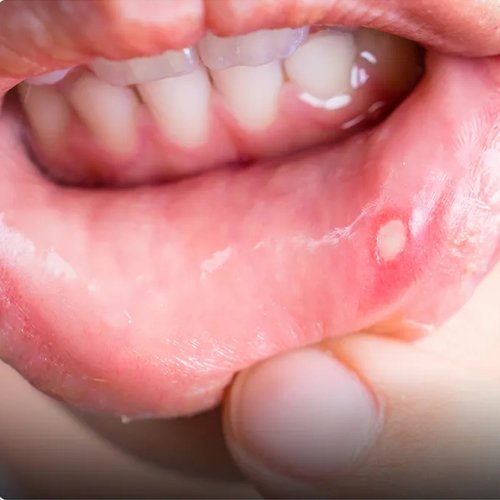 Mouth ulcers are small sores that form on your gums, lips, inner cheeks or palate (roof of mouth). They can be triggered by several different factors, including minor injuries, hormonal changes and emotional stress.
Mouth ulcers are small sores that form on your gums, lips, inner cheeks or palate (roof of mouth). They can be triggered by several different factors, including minor injuries, hormonal changes and emotional stress.
Mouth ulcers aren’t contagious — and they go away on their own — but there are treatments to help ease pain and discomfort.
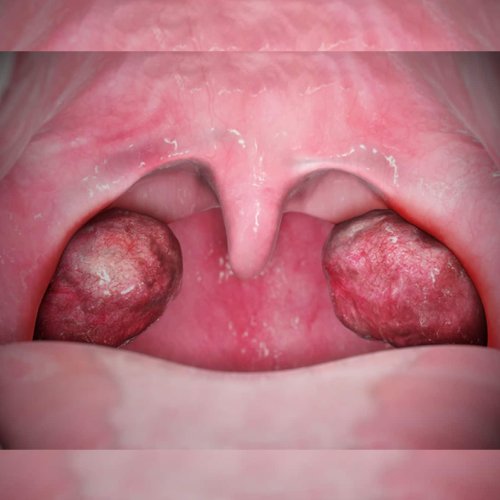 Tonsillitis is inflammation of the tonsils, two oval-shaped pads of tissue at the back of the throat — one tonsil on each side. Signs and symptoms of tonsillitis include swollen tonsils, sore throat, difficulty swallowing and tender lymph nodes on the sides of the neck.
Tonsillitis is inflammation of the tonsils, two oval-shaped pads of tissue at the back of the throat — one tonsil on each side. Signs and symptoms of tonsillitis include swollen tonsils, sore throat, difficulty swallowing and tender lymph nodes on the sides of the neck.
Most cases of tonsillitis are caused by infection with a common virus, but bacterial infections also may cause tonsillitis.
Because appropriate treatment for tonsillitis depends on the cause, it's important to get a prompt and accurate diagnosis. Surgery to remove tonsils, once a common procedure to treat tonsillitis, is usually performed only when tonsillitis occurs frequently, doesn't respond to other treatments or causes serious complications.
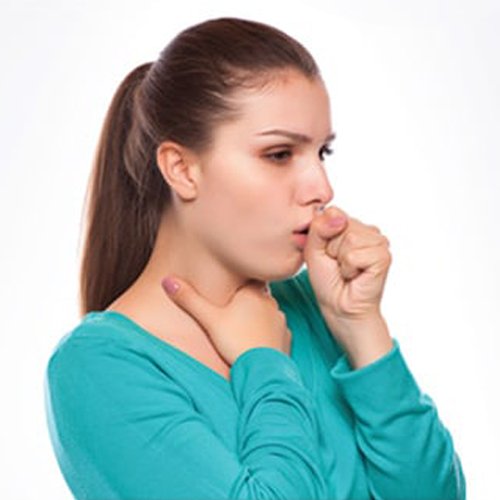 A cough is a natural reflex that is your body’s way of removing irritants from your upper (throat) and lower (lungs) airways. A cough helps your body heal and protect itself.
A cough is a natural reflex that is your body’s way of removing irritants from your upper (throat) and lower (lungs) airways. A cough helps your body heal and protect itself.
Treating a cough will depend on what is causing the cough. If you have an infection, your doctor might prescribe some type of antibiotic or antiviral medication, but most viral coughs do not require antiviral medications. For GERD, they might suggest diet changes or prescribe a proton pump inhibitor or an H2 blocker.
Water can be good for a cough. Drinking it can help ease a cough from throat irritation or dryness. Adding it to the air with a vaporizer or a steamy shower are other ways water relieves a cough.
Quitting smoking and avoiding other irritants are also ways to relieve a cough. Those irritants may include medicines, scents (like perfume or candles), smoke or allergens.
 Dysphagia is the medical term for swallowing difficulties.
Dysphagia is the medical term for swallowing difficulties.
Some people with dysphagia have problems swallowing certain foods or liquids, while others can't swallow at all.
Other signs of dysphagia include:
• coughing or choking when eating or drinking
• bringing food back up, sometimes through the nose
• a sensation that food is stuck in your throat or chest
• persistent drooling of saliva
• being unable to chew food properly
• a gurgly, wet-sounding voice when eating or drinking
Over time, dysphagia can also cause symptoms such as weight loss and repeated chest infections.
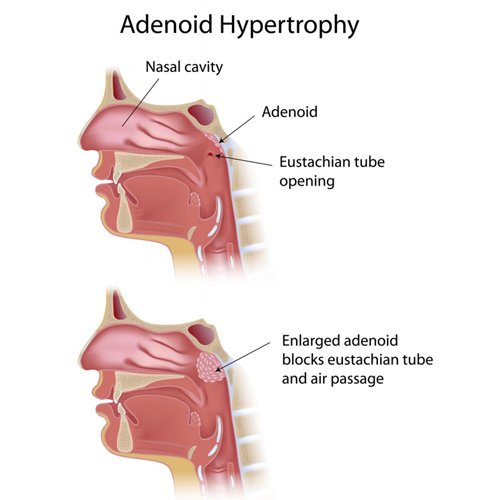 The adenoids are a mass of soft tissue behind the nasal cavity. Like lymph nodes, adenoids are part of the immune system and are made of the same type of tissue (lymphoid tissue). White blood cells circulate through the adenoids and other lymphoid tissue, reacting to foreign invaders in the body.
The adenoids are a mass of soft tissue behind the nasal cavity. Like lymph nodes, adenoids are part of the immune system and are made of the same type of tissue (lymphoid tissue). White blood cells circulate through the adenoids and other lymphoid tissue, reacting to foreign invaders in the body.
We all have adenoids at birth and in childhood, but as we head into adolescence they start to shrink. By adulthood, most people's adenoids have disappeared.
Adenoids surgery (adenoidectomy): Surgery to remove the adenoids is often required when the adenoids are large enough to cause other health problems. Children's adenoids may be removed surgically with no apparent ill effects.
 Vertigo is a symptom, rather than a condition itself. It's the sensation that you, or the environment around you, is moving or spinning.
Vertigo is a symptom, rather than a condition itself. It's the sensation that you, or the environment around you, is moving or spinning.
This feeling may be barely noticeable, or it may be so severe that you find it difficult to keep your balance and do everyday tasks.
Attacks of vertigo can develop suddenly and last for a few seconds, or they may last much longer. If you have severe vertigo, your symptoms may be constant and last for several days, making normal life very difficult.
Other symptoms associated with vertigo may include:
• loss of balance – which can make it difficult to stand or walk
• feeling sick or being sick
• dizziness
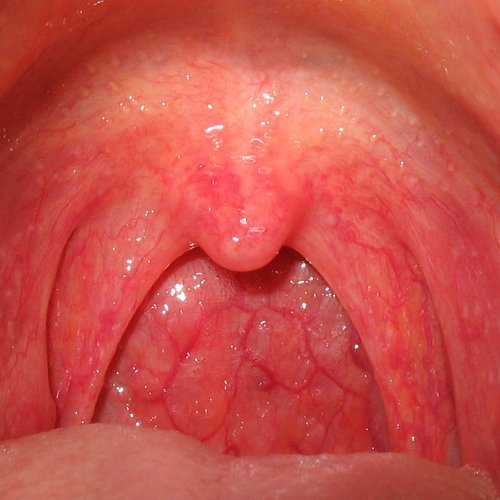 A sore throat can make it painful to swallow. A sore throat can also feel dry and scratchy.
A sore throat can make it painful to swallow. A sore throat can also feel dry and scratchy.
Sore throat can be a symptom of strep throat, the common cold, allergies, or other upper respiratory tract illness. Sore throat caused by a virus or the bacteria called group A Streptococcus can have similar symptoms.
Sometimes the following symptoms suggest a virus is causing the illness instead of Strep throat:
• Cough
• Runny nose
• Hoarseness (changes in your voice that makes it sound breathy, raspy, or strained)
• Conjunctivitis (also called pink eye)
 The nasal septum is the cartilage and bone in your nose. The septum divides the nasal cavity (inside your nose) into a right and left side. When the septum is off-center or leans to one side of the nasal cavity, it has “deviated.” Doctors call this a deviated nasal septum.
The nasal septum is the cartilage and bone in your nose. The septum divides the nasal cavity (inside your nose) into a right and left side. When the septum is off-center or leans to one side of the nasal cavity, it has “deviated.” Doctors call this a deviated nasal septum.
If you have a minor deviated septum, you may have mild symptoms or no symptoms at all. If your deviated septum is more severe, it may affect your breathing, cause headaches or lead to infections.
 Allergies are your body’s reaction to a normally harmless substance such as pollen, molds, animal dander, latex, certain foods and insect stings.
Allergies are your body’s reaction to a normally harmless substance such as pollen, molds, animal dander, latex, certain foods and insect stings.
Allergy symptoms range from mild – rash or hives, itchiness, runny nose, watery/red eyes – to life-threatening. Treatments include antihistamines, decongestants, nasal steroids, asthma medicines and immunotherapy.
 Snoring is noisy breathing while you sleep. It’s a common condition that can affect anyone, although it happens more often in men and in people who are overweight. Snoring tends to get worse with age.
Snoring is noisy breathing while you sleep. It’s a common condition that can affect anyone, although it happens more often in men and in people who are overweight. Snoring tends to get worse with age.
Snoring once in a while isn’t usually a serious problem. It’s mostly a nuisance for your bed partner. But if you’re a long-term snorer, you not only disrupt the sleep patterns of those close to you, you hurt your own sleep quality.
Snoring can itself be a symptom of a health problem like obstructive sleep apnea. Talk to your doctor if you’re overly sleepy during the day, if you snore often or very loudly, or if your partner notices that you sometimes stop breathing altogether. You might need medical help so you (and your loved ones) can get a good night’s sleep.
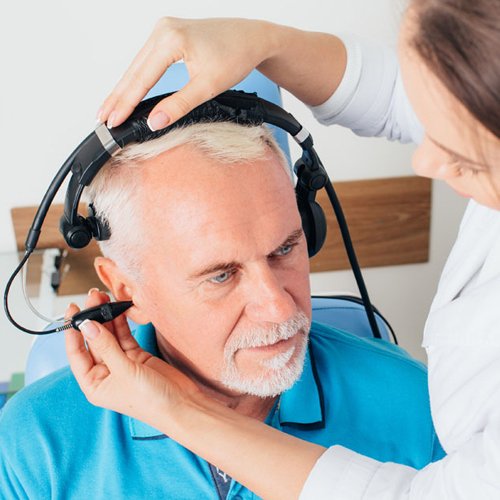 An audiometry exam tests your ability to hear sounds. Sounds vary, based on their loudness (intensity) and the speed of sound wave vibrations (tone).
An audiometry exam tests your ability to hear sounds. Sounds vary, based on their loudness (intensity) and the speed of sound wave vibrations (tone).
Hearing occurs when sound waves stimulate the nerves of the inner ear. The sound then travels along nerve pathways to the brain.
Sound waves can travel to the inner ear through the ear canal, eardrum, and bones of the middle ear (air conduction). They can also pass through the bones around and behind the ear (bone conduction).
The INTENSITY of sound is measured in decibels (dB):
• A whisper is about 20 dB.
• Loud music (some concerts) is around 80 to 120 dB.
• A jet engine is about 140 to 180 dB.
Sounds greater than 85 dB can cause hearing loss after a few hours. Louder sounds can cause immediate pain, and hearing loss can develop in a very short time.
The TONE of sound is measured in cycles per second (cps) or Hertz (Hz):
• Low bass tones range around 50 to 60 Hz.
• Shrill, high-pitched tones range around 10,000 Hz or higher.
The normal range of human hearing is about 20 to 20,000 Hz. Some animals can hear up to 50,000 Hz. Human speech is usually 500 to 3,000 Hz.
 Speech therapy is the assessment and treatment of communication problems and speech disorders. It is performed by speech-language pathologists (SLPs), which are often referred to as speech therapists.
Speech therapy is the assessment and treatment of communication problems and speech disorders. It is performed by speech-language pathologists (SLPs), which are often referred to as speech therapists.
Speech therapy techniques are used to improve communication. These include articulation therapy, language intervention activities, and others depending on the type of speech or language disorder.
Speech therapy may be needed for speech disorders that develop in childhood or speech impairments in adults caused by an injury or illness, such as stroke or brain injury.
 Healthcare providers perform allergy tests to determine whether your immune system overreacts to certain substances (allergens). If you have an allergic reaction, it means you have an allergy.
Healthcare providers perform allergy tests to determine whether your immune system overreacts to certain substances (allergens). If you have an allergic reaction, it means you have an allergy.
People can be allergic to things in the environment like mold, pollen and pet dander. Some people have allergic reactions to bee stings or latex. People with food allergies may not be able to tolerate peanuts, milk or soy.
Designed by Seacom Digital